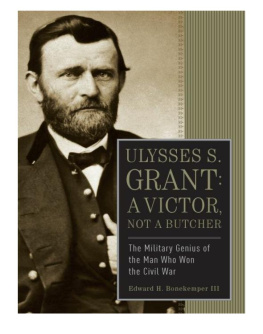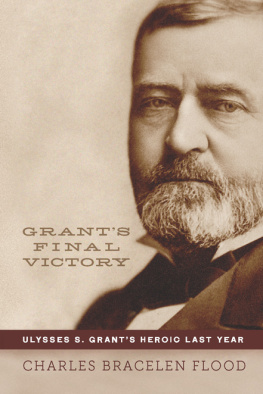The Presidency of
ULYSSES S.
GRANT
AMERICAN PRESIDENCY SERIES
Clifford S. Griffin, Donald R. McCoy, and Homer E. Socolofsky, Founding Editors
George Washington, Forrest McDonald
John Adams, Ralph Adams Brown
Thomas Jefferson, Forrest McDonald
James Madison, Robert Allen Rutland
James Monroe, Noble E. Cunningham, Jr.
John Quincy Adams, Mary W. M. Hargreaves
Andrew Jackson, Donald B. Cole
Martin Van Buren, Major L. Wilson
William Henry Harrison & John Tyler, Norma Lois Peterson
James K. Polk, Paul H. Bergeron
Zachary Taylor & Millard Fillmore, Elbert B. Smith
Franklin Pierce, Larry Gara
James Buchanan, Elbert B. Smith
Abraham Lincoln, Phillip Shaw Paludan
Andrew Johnson, Albert Castel
Rutherford B. Hayes, Ari Hoogenboom
James A. Garfield & Chester A. Arthur, Justus D. Doenecke
Grover Cleveland, Richard E. Welch, Jr.
Benjamin Harrison, Homer B. Socolofsky & Allan B. Spetter
William McKinley, Lewis L. Gould
William Howard Taft, Lewis L. Gould
Theodore Roosevelt, Second Edition, Lewis L. Gould
Woodrow Wilson, Kendrick A. Clements
Warren G. Harding, Eugene P. Trani & David L. Wilson
Calvin Coolidge, Robert H. Ferrell
Herbert C. Hoover, Martin L. Fausold
Harry S. Truman, Donald R. McCoy
Dwight D. Eisenhower, Second Edition, Chester J. Pach, Jr., & Elmo Richardson
John F. Kennedy, Second Edition, James N. Giglio
Lyndon B. Johnson, Vaughn Davis Bornet
Richard Nixon, Melvin Small
Gerald R. Ford, John Robert Greene
James Earl Carter, Jr., Second Edition, Burton I. Kaufman & Scott Kaufman
George H. W. Bush, Second Edition, Revised and Expanded, John Robert Greene
The Presidency of
ULYSSES S.
GRANT

Charles W. Calhoun
UNIVERSITY PRESS OF KANSAS
2017 by the University Press of Kansas
All rights reserved
Published by the University Press of Kansas (Lawrence, Kansas 66045), which was organized by the Kansas Board of Regents and is operated and funded by Emporia State University, Fort Hays State University, Kansas State University, Pittsburg State University, the University of Kansas, and Wichita State University
Library of Congress Cataloging-in-Publication Data
Names: Calhoun, Charles W. (Charles William), 1948 author.
Title: The presidency of Ulysses S. Grant / Charles W. Calhoun.
Description: Lawrence, Kansas : University Press of Kansas, 2017.
Series: American presidency series | Includes bibliographical references and index.
Identifiers: LCCN 2017026679
ISBN 9780700624843 (hardback) | ISBN 9780700624850 (ebook)
Subjects: LCSH: United StatesPolitics and government18691877. | Grant, Ulysses S. (Ulysses Simpson), 18221885. | PresidentsUnited StatesBiography | BISAC: HISTORY / United States / 19th Century. |BIOGRAPHY & AUTOBIOGRAPHY / Presidents & Heads of State. | POLITICAL SCIENCE / Government / Executive Branch.
Classification: LCC E671 .C25 2017 | DDC 973.8/2092 [B]dc23 LC record available at https://lccn.loc.gov/2017026679.
British Library Cataloguing-in-Publication Data is available.
Printed in the United States of America
10 9 8 7 6 5 4 3 2 1
The paper used in this publication is recycled and contains 30 percent postconsumer waste. It is acid free and meets the minimum requirements of the American National Standard for Permanence of Paper for Printed Library Materials Z39.48-1992.
For Bonnie
CONTENTS
21. Securing the Succession
FOREWORD
The aim of the American Presidency Series is to present historians and the general reading public with interesting, scholarly assessments of the various presidential administrations. These interpretive surveys are intended to cover the broad ground among biographies, specialized monographs, and journalistic accounts. As such, each is a comprehensive work that draws upon original sources and pertinent secondary literature yet leaves room for the authors own analysis and interpretation.
Volumes in the series present the data essential to understanding the administration under consideration. Particularly, each book treats the then-current problems facing the United States and its people and how the president and his associates felt about, thought about, and worked to cope with these problems. Attention is given to how the office developed and operated during the presidents tenure. Equally important is consideration of the vital relationships among the president, his staff, the executive officers, Congress, foreign representatives, the judiciary, state officials, the public, political parties, the press, and influential private citizens. The series is also concerned with how this unique American institutionthe presidencywas viewed by the presidents, and with what results.
All this is set, insofar as possible, in the context not only of contemporary politics but also of economics, international relations, law, morals, public administration, religion, and thought. Such a broad approach is necessary to understanding, for a presidential administration is more than the elected and appointed officers composing it, since its work so often reflects the major problems, anxieties, and glories of the nation. In short, the authors in this series strive to recount and evaluate the record of each administration and to identify its distinctiveness and relationships to the past, its own time, and the future.
The General Editors
PREFACE
When Fred Woodward of the University Press of Kansas invited me to write this book, I accepted the honor with pleasure. But I also knew that the task that lay ahead was daunting. No scholarly work focusing on Grants presidency had appeared since the 1930s. Biographies tended to dwell on the war years and gave short shrift to his administration, even though Grant spent twice as much time in the White House as he did fighting in the Union army. As president, he confronted momentous issues, and his administration was steeped in controversy. Yet most biographers drawn to examine his military career seemed relatively uninterested or unversed in the deeply consequential questions that marked his two presidential terms. Those issues of politics and governance have stood at the center of my scholarly concern for more than forty years.
My aim in this book, therefore, was to try to get it right in treating the important questions of the Grant era. To do that, I realized that I would need to go beyond secondary works and resort primarily to a close examination of original sources. That has taken timeand space. Assembling the story often required a treatment of some controversial issues or events in considerable detail in order to dispel myth and misinterpretation. It also underscored that a presidency is created not only by the president but also by myriad other actorsantagonists as well as alliesand in the chapters that follow, others occasionally take the foreground. In many ways, rethinking Grants presidency reveals his administration as almost sui generis, for perhaps no other president found his time in office so embattled. I have not engaged in rehabilitation so much as clarification and correction, recognizing that Grant deserves to be regarded as a better president than his reputation suggests, but also acknowledging that he sometimes fell short of his aims. The image of the presidency of Ulysses S. Grant occupies an important place in our political culture. My aim has been to revisit his administration to arrive at an account more serviceable to our usable past.
Next page









